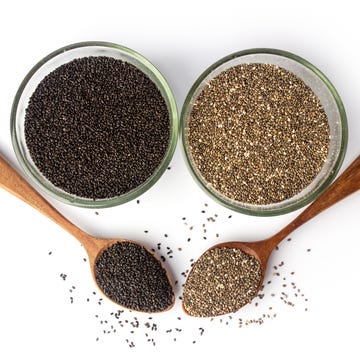1Fatty fish
 Ekaterina Smirnova//Getty Images
Ekaterina Smirnova//Getty ImagesResearch shows that magnesium, riboflavin (vitamin B2), vitamin B12 and coenzyme Q10 — four ingredients commonly found in fish like tuna and salmon — may help prevent migraines. Salmon alone has 108% of our recommended daily intake of B12 in a 3-ounce serving. As a bonus, fatty fish are also full of anti-inflammatory omega-3 fatty acids.
2Walnuts and avocados
 Westend61//Getty Images
Westend61//Getty ImagesNot only do omega-3 fatty acids help fight inflammation, studies have found that people who consume more EPA and DHA (the two main types of omega-3 fatty acids) have fewer headaches. Walnuts and avocados are both rich in both omega-3 fatty acids and magnesium, notes Dr. Parikh, but avocados have the added benefit of also being high in riboflavin.
Advertisement - Continue Reading Below
3Eggs
 BURCU ATALAY TANKUT//Getty Images
BURCU ATALAY TANKUT//Getty ImagesEggs are high in riboflavin, but that’s not the only reason you might want to eat them in the midst of a migraine. “We know that patients with a migraine brain, sometimes that brain is hyper-irritable to a change in schedule and a patient may not eat regularly during a migraine attack,” says Meryle Diamond, M.D., the managing director at the Diamond Headache Clinic in Chicago. “So we try to encourage our patients, even if they can’t eat a lot because of nausea, to make sure they get something in.” She says hard-boiled or scrambled eggs provide easily digestible protein, which will help keep your blood glucose levels stable and your whole body functioning better, including your brain. “It’s important to feed your brain,” adds Dr. Diamond.
RELATED: 60 Easy Egg Recipes
4Water
 NickS//Giphy
NickS//GiphyOkay, so it's not actually a food, but staying hydrated is the one of the most important things you can do to treat and prevent migraines. “One of the first things I always tell my patients is, during a migraine attack it's really easy to get dehydrated,” says Dr. Diamond. Some patients develop an aversion to eating and drinking, she says, while others urinate more, “so always keeping up with fluids is important.”
RELATED: How Much Water Should You Drink Every Day, According to Experts
Advertisement - Continue Reading Below
5Potatoes
 fcafotodigital//Getty Images
fcafotodigital//Getty Images 6Ginger
 Ahmed Areef / EyeEm//Getty Images
Ahmed Areef / EyeEm//Getty ImagesIf your headaches are accompanied by nausea, ginger should be your best friend. “Ginger is a really good, natural, anti-nausea food,” says Dr. Parikh. If you’re having trouble keeping solids down, she says, it can be especially helpful to add sliced ginger to water. That way you can combat the nausea and stay hydrated at the same time.
Advertisement - Continue Reading Below
7Cantaloupe
 Claudia Totir//Getty Images
Claudia Totir//Getty ImagesSome studies have shown that cantaloupe can help stabilize insulin levels in non-diabetic patients, and since low blood sugar can be a headache trigger, eating cantaloupe could potentially stave off headaches. Plus, the fruit contains plenty of magnesium and potassium as well as water to support good hydration.
8Navy beans
 Cavan Images//Getty Images
Cavan Images//Getty Images Advertisement - Continue Reading Below
9Coffee
 PJjaruwan//Getty Images
PJjaruwan//Getty Images“This is a double-edged sword,” says Dr. Diamond. “Caffeine can sometimes help with migraine pain. However, if you overuse caffeine, it could come back and cause a rebound.” When you consume caffeine daily and then suddenly stop, the withdrawal can also trigger a headache. Essentially, according to Dr. Diamond, caffeine is a wonderful therapy if you don’t regularly take it and only use it intermittently or sporadically. It’s also important to point out that coffee is a diuretic, which means it makes you urinate and expel fluids from your body. “One tip I sometimes give my patients is if they notice that lack of hydration is a trigger for them, for every cup of coffee they drink, they should also drink a cup of water,” says Dr. Parikh.
10Low-fat milk
 Anna Kurzaeva//Getty Images
Anna Kurzaeva//Getty ImagesMilk is a hydrating protein-rich liquid and full of important minerals like calcium and potassium. It’s also naturally high in riboflavin and fortified with vitamin D, which some research suggests may reduce the frequency of headaches in people with migraine. In fact, research has found an inverse relationship between dairy consumption and headache frequency in general. That said, dairy can be pro-inflammatory for certain people, says Dr. Diamond. “I always think keeping a headache diary or a headache journal is important because it's really difficult to say a food is a trigger if you don't keep track of it to see if it really has an impact or not,” she says. So, if after logging your food intake for a few weeks, dairy seems to be a trigger for you, then it’s smart to avoid it.
Advertisement - Continue Reading Below
Advertisement - Continue Reading Below
Advertisement - Continue Reading Below






















